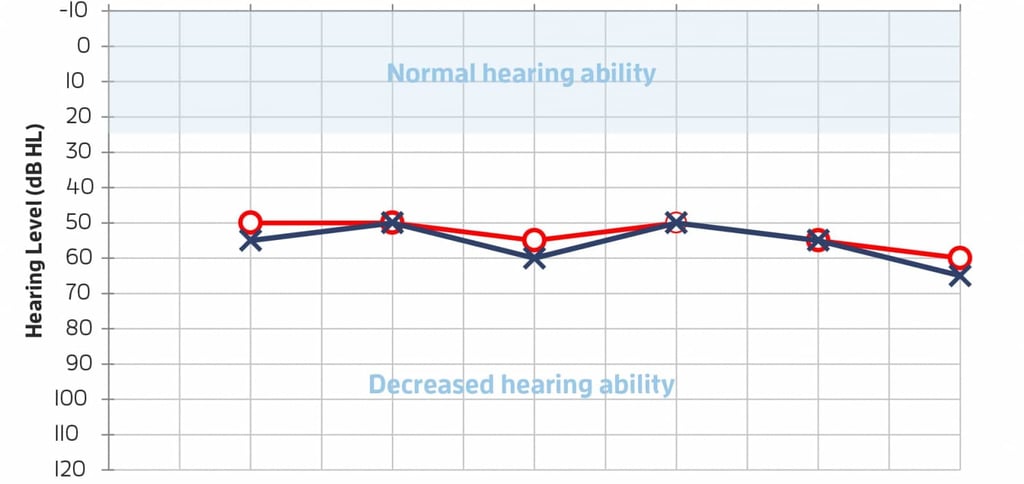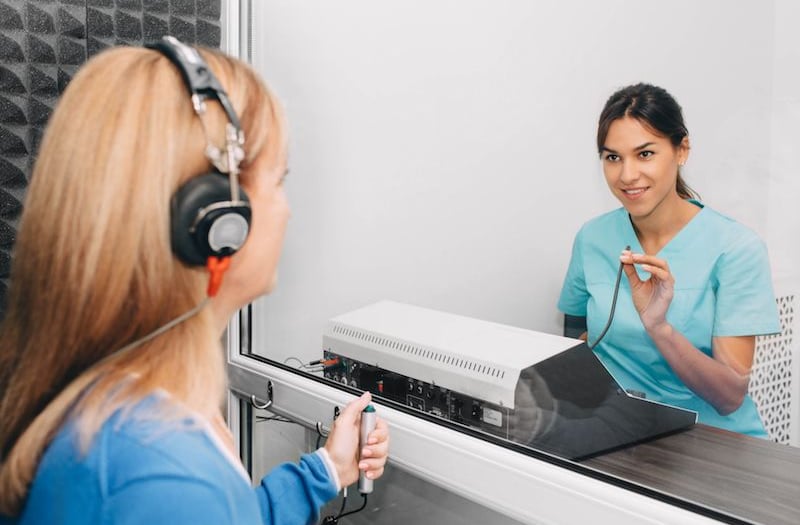A what to expect guide for hearing tests
A hearing test with one of our professionally trained audiologists takes from 20 to 60 minutes to completely examine your hearing.
5/13/20255 min read


We ask for a basic hearing screen, which takes 5- 10 minutes on the initial appointment, before coming back to see us. This helps us address any pre-existing hearing conditions and understand your medical history. The stages of a hearing test are:
Medical history review/screening examination
Visual ear exam
Pure tone audiometry (tone tests)
Speech recognition tests
Tympanometry (middle ear function test) only if needed.
The main goal of the hearing test is to examine and determine the type and extent of hearing loss you have. We can then correctly recommend hearing aids that suit your needs and communicate with you about the pitches you might be missing. The process is painless and non-invasive, which means your results will be given to you straight away, so we can act promptly to find a solution you are happy with.


How do we analyse your hearing?
We expose your hearing to thresholds around 0 -25 decibels, which are considered a normal range of hearing. We want to ensure you can hear these sounds to make sure you are equipped for daily life and that your quality of life is not suffering. We then expose your hearing to a higher threshold that will indicate hearing loss, and the pattern will help us identify the type of hearing loss you have, whether it's conductive, sensorineural or mixed.
What do the different types of hearing loss mean?
Conductive Hearing Loss
It is a problem area that relates to the outer or the middle ear, which is often caused by a blockage to sound or reduction before sound hits the inner ear. The common causes of this are earwax buildup, which we can efficiently remove, and a buildup of fluid in the middle ear, which is typically from colds or infections. Perforated eardrums that come from loud noises. Otosclerosis is abnormal bone growth that can be treated through simple surgery, but hearing aids can help if the damage is permanent.
Sensorineural Hearing Loss
It is a problem caused by the inner ear, the cochlea or the auditory nerve. These are the hair cells that are placed inside your inner ear and can be damaged, and are common in those who are aging, have noise exposure, certain medications, head trauma or genetic conditions. This type of hearing loss is typically permanent and is only managed with a hearing aid, and in severe cases, will be managed through cochlear implants.
Mixed Hearing Loss
This refers to the combination of both outer and inner ear hearing loss, which is much more complex to understand. It can be because of both the conductive and sensorineural factors, which means that the conductive will be addressed first. This will involve a treatment to remove wax or any blockages before moving on to the sensorineural treatment, which can be because of your age or nerve hairs. This procedure will take longer as it has two stages.


How do you book a hearing test with us?
When booking a hearing test with us, it couldn't be simpler! We want to make sure our patients are seen effectively and professionally without delay. As we understand, your hearing is one of your main senses in your daily life, we want to ensure your quality of life is maintained at all times! Just fill out our contact form, WhatsApp us or give us a ring on +353 (0) 061 313 633.
Does the hearing test include aftercare?
Yes! We want to focus on making sure your hearing is in great condition all year round. We will understand your results and help you manage the hearing loss with ongoing hearing health checks. This will include the following:
Explanation of results
We will run through the audiogram, which is a visual chart of your hearing thresholds. Talk to you about your type and degree of hearing loss, if any. Highlight possible problems in your day-to-day life that could be causing your hearing loss or stopping you from enjoying your quality of life.
Next steps: if a hearing loss is found
It depends on your results and previous stage what we do for your next steps, we can guarantee that it will be tailored to your needs and encourage you to ask us personally what you’d like to do in combination with our professional advice.
We will show you a range of the latest hearing aids that will fit your ear and hearing loss perfectly, and walk you through your options so that you have a clear choice of price, comfort and technology. You will see our specialists if there is any medical issue, like infection or blockages, as you may need to be referred to a doctor for treatment. Following this, you will undergo further tests to make sure your hearing doesn't deteriorate over time and give us a more detailed diagnosis over an extended time for greater accuracy.


Hearing aid fitting and support
If we prescribed you a hearing aid, we will then book you in for a separate fitting appointment to make sure we get the best fit and type for your hearing loss. Our professional audiologists will program the hearing aid to suit your hearing loss and let you get comfortable with the adjustment before letting you go. This will take some time to adjust to and get used to, but your hearing will be improved, and you’ll notice an improvement in your daily life too. This allows you to ask any questions and come back to us with any aftercare to make sure you have settled into your new hearing aids well.
Education and advice
We want to make sure all our patients are given the best advice and education so they feel in control of their own hearing. This will include tips on protecting your hearing, as this will help keep your hearing loss at bay in loud environments and reduce further damage. Communication strategies are vital once you are using your new hearing aid, as when you are facing people, it will now sound clearer, with less background noise, and this adjustment will take your brain and hearing time to react at speed. We also specialise in tinnitus, which is the ringing of the ears, and vital that we understand if your environment is causing this to happen.
Regular checkups
We recommend coming to visit us every 6 months to start with, to make sure you’ve settled into your new hearing aids correctly, and then, following this, it would be every 1-2 years to encourage regular testing of your hearing. We will expose your hearing to loud noises to test how your hearing is handling this change. If you are over the age of 50, then we will ask you to come in for more regular check-ups.
If you are wearing hearing aids, the annual reviews are standard to make sure they are working properly and that your hearing hasn't changed. It may change without you noticing, which is very common, as our brains will compensate quickly for any adjustment. We plan to look after our patients during the hearing aid procedure and for a lifetime.
Get In Touch
Address
61 Catherine St, Prior's-Land, Limerick, V94 078P, Ireland
Contacts
Tel: +353 (0) 061 313 633
WhatsApp: +353 87 360 7747
info@ferghac.ie
Opening Hours
Monday - Friday:
9:00 AM - 5:00 PM
Saturday - Sunday:
Closed
We close for our lunch hour from 1-2.
We are closed bank holidays, St Patrick's Day & Good Friday
Services
